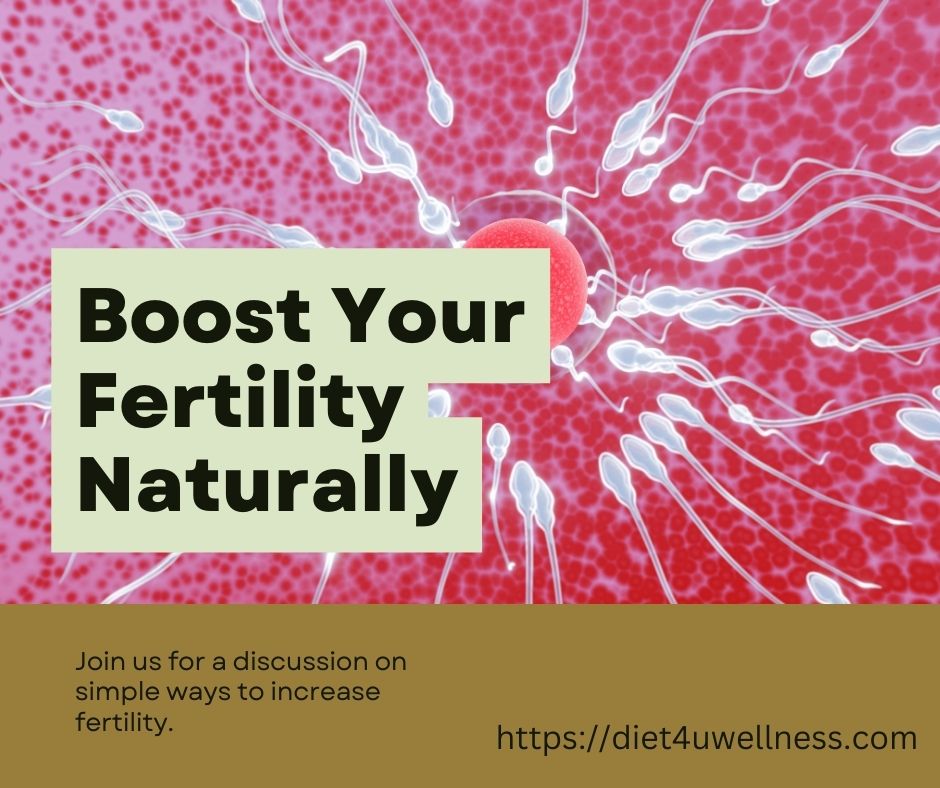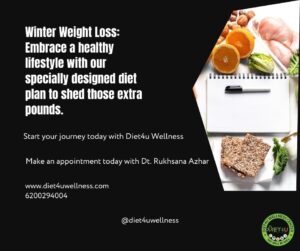
Unlocking Natural Fertility: Expert Tips on How to Increase Fertility Naturally
Table of Contents
Do you intend to become pregnant with a query on how to increase fertility naturally? It may occur to you to see if there’s anything you could do to facilitate conception. You may need assistance from a dietitian.
Many biological elements are involved in getting pregnant, and any disorder to have a baby can be tweaked with the help of a perfect diet plan. In this post, we will explore a few primary lifestyle elements critical to fertility, along with strategies for optimizing your lifestyle to enhance reproductive health.
The dietitian from Diet4u Wellness has the power to influence the nutritional value of the eggs and create a more wholesome environment for reproduction through our lifestyle choices.
You can increase your chances of becoming pregnant by eating a nutritious, well-balanced diet, exercising frequently, controlling your stress, ensuring enough sleep, and avoiding or cutting back on alcohol and smoking.
At least the magic fertility diet is not a taboo!
Because infertility is still such a taboo subject, a large number of infertile women struggle in silence. The difficulty with fertility problems is that the topics of discussion are uncomfortable body parts. You may feel “other than” or “less than” when you are infertile, as your body has let you down. Because of this, infertility is frequently accompanied by a stigma.
Many biological elements are involved in getting pregnant, and any disorder to have a baby can be tweaked with the help of a perfect diet plan.
Feel free! The time has come for you to talk with dietitian Rukhsana Azhar
Diet plan and female fertility
In this post, we will explore a few primary lifestyle elements critical to fertility, along with strategies for optimizing your lifestyle to enhance reproductive health.
Fertility and Age
To become pregnant, you must have healthy eggs. From a biological perspective, your eggs will be more beneficial the younger you are. Your ovarian reserve, or the quantity and quality of your eggs, decreases with age. However, it would help if you did not lose hope because of the success of a good diet plan, which is proposed and under professional supervision.
Lifestyle Selections and Their Effects
Diet4 Wellness has the power to influence the nutritional value of our eggs and create a more wholesome environment for reproduction through our lifestyle choices.
You can increase your chances of becoming pregnant by eating a nutritious, well-balanced diet, exercising frequently, controlling your stress, ensuring enough sleep, and avoiding or cutting back on alcohol and smoking.
You can increase your fertility by following a Mediterranean diet consisting primarily of plant foods like fruits, vegetables, nuts, legumes, and whole grains and includes modest amounts of dairy, fish, meat, and eggs. Learn how to enhance your nutritious diet with a fertility-friendly diet plan and shopping list.
How research shows the importance of the guidance of a dietitian?
The foods you choose to eat or avoid may impact your reproductive system. Hormone equilibrium is greatly aided by fertility nutrition. The organs that make the hormones necessary for reproduction will be supported and nourished by a healthy diet.
An 80% success rate was demonstrated by a University of Surrey study, including couples with previous experiences of infertility who changed their diet and lifestyle and used nutritional supplements. Many people are not aware that hormonal abnormalities that could impair fertility can be corrected with nutrition. Certain foods and beverages may also reduce fertility.
Dietitian addresses the root cause rather than merely the symptoms.
Treating infertility symptoms alone—hormone imbalance, amenorrhea, being overweight or underweight, PCOS, etc.—is like applying bandages to a gaping hole. To increase your chances of conceiving, a holistic solution to infertility looks for the underlying reasons for these symptoms and suggests lifestyle modifications that will cure the body and lessen or eliminate the symptoms. Nutrition is essential to achieving that. Your body may use everything you eat as fuel to generate hormones, enzymes, blood, and bone. Everything that goes into your mouth affects every cell and action in your body.
Since nutrition is the cornerstone of good health, food must provide the proper nutrients to maintain balance and stave off potential health issues.
Join hands with our dietary initiative.
With the help of our nutrition program, you may increase your chances of becoming pregnant and having a healthy baby by learning what foods and lifestyle practices to adopt and what to avoid. Our Registered Dietitian, Rukhsana Azhar, employs an integrated approach incorporating diet, exercise, and relaxation to nourish your body on all levels, based on the latest nutrition research. Our Nutrition Programme will help you optimize your weight, get enough vitamins from food and supplements, and recommend healthy lifestyle practices to help you become more fertile and have a healthy pregnancy.
The benefits of a diet conducive to conception are:
- Boost nutritional distribution and absorption
- Control the level of blood sugar to treat gestational diabetes and PCOS
- Remove contaminants from the environment
- Harmonize hormones
- By optimizing your weight, achieve the optimal body mass index (BMI) for conception.
How does a dietitian assist in increasing fertility naturally?
You are about to dive into a dietary framework that has shown excellent results in the past and has added a lot of success stories to our database.
Boost your fertility naturally, fortunately, with a few different methods explained below.
Why foods rich in antioxidants are suggested?
Antioxidants can be found in various foods, such as whole grains, fruits, vegetables, nuts, seeds, herbs, spices—even cocoa.
Fertility may benefit from antioxidants by:
- Defending DNA, mitochondria, and cells from oxidative damage
- Cut down on hyperandrogenism
- Reducing the level of insulin resistance
- Enhancing blood flow within the endometrial
- Impacting steroidogenesis and prostaglandin production
For example-Study says:
It was consuming 75 grams of antioxidant-rich walnuts daily enhanced sperm quality in a 2012 trial including young, adult men. A study conducted by a trustworthy source of 232 women indicated that greater folate intake was related to more excellent rates of implantation of eggs, clinical gestation, and live birth.
Among the foods high in antioxidants are:
- Spinach, turnip greens, kale, and Swiss chard are rich in antioxidants, folate, and fiber.
- Broccoli: Packed with vitamin C, this vegetable works incredibly well to help you absorb iron when eaten with whole wheat or brown rice pasta.
- Strawberries, blueberries, and raspberries: Phytonutrients with anti-inflammatory properties and inherent antioxidants
Why big breakfast is suggested to deal with how to increase fertility naturally?
The timing of food intake significantly impacts insulin resistance and hormone levels, according to research from The Hebrew University of Jerusalem and Tel Aviv University. The study, which tracked 60 PCOS-afflicted women aged 25 to 39 for 12 weeks, was published in the journal Clinical Science in 2013. The 60 women took in about 1,800 calories daily, half of their energy at breakfast and half at dinner.
The findings showed that ovulation rates were more significant in the group that consumed a more extensive breakfast than in the group that ate a smaller dinner. Insulin resistance and glucose levels were also eight percent lower in the “breakfast” group. In addition, in this subgroup of research participants, testosterone levels dropped by 50%. In contrast, no changes were observed in these domains in the “dinner” group.
In light of these findings, we advise women who want to use natural methods to manage their PCOS and related insulin resistance to eat a substantial breakfast and avoid heavy meals in the evening.
Suggested Breakfast Plate
A PCOS breakfast plate that is healthful will have four main ingredients:
Top-notch proteins (one-third of your meal)
Fibre and complex, low-GI carbs (one-third of your plate)
Suitable fats (half of your meal)
foods high in antioxidants and low in inflammation (on the side)
Why to avoid trans-fat with PCOS?
Dangerous trans fats found in processed meals can aggravate PCOS symptoms by causing inflammation and insulin resistance. Fried foods, quick meals, and packaged snacks are best avoided. Instead, concentrate on including foods high in healthy fats, such as almonds, avocados, and olive oil, in your diet.
Nutritional fats should be consumed daily to improve general health and fertility. On the other hand, because trans fats impair insulin sensitivity, there is a higher chance of ovulatory infertility while using them.
Trans fats are typically included in fried foods, some margarine, industrial items, and baked goods. They are also frequently found in processed vegetable oils.
Why is a low-carb diet for PCOS suggested?
Cutting back on carbohydrates—or, in the case of the ketogenic diet (The ketogenic diet is a low-carb, high-fat, adequate-protein nutritional regimen), eliminating them—can help stabilize your blood sugar levels. Simple carbohydrates like sugars and white flour won’t cause the rapid rises in blood sugar that come with eating a lot of them. Reduced insulin production also results from a lower carbohydrate diet, which lessens the body’s inflammatory load.
Thus, studies have shown that low-carb diets improve blood dysregulation.
This comprehensive list of all the low-carb foods suitable for keto eating.
- Seafood and fish.
- Low-carb veggies.
- Cheddar.
- Avocados.
- Chickens.
- Hens.
- Nuts, seeds, and good fats.
- Cottage cheese and plain Greek yogurt.
Why are fibrous foods suggested for PCOS?
Women with PCOS can benefit significantly from a high-fiber diet, including reduced insulin levels, antioxidants that reduce inflammation, improved gut flora and increase fertility in natural way.
Advantages of Fiber for PCOS
- It improves the health of the gut
- Insulin sensitivity is improved.
- Glucose control is improved.
- The risk of heart issues is reduced.
- Cholesterol levels are dwindled.
For women with PCOS, fiber offers a plethora of health advantages. Thirteen grams of fiber a day is the average for women. Women with PCOS frequently consume even less because they follow low-carb diets. Remind yourself that low-carb diets are not necessary for every woman with PCOS. However, if you discover that a lower-carb diet is ideal for you, use my above methods to boost your fiber consumption as much as possible.
Fibrous food
Which foods are high in fiber? Try these foods that are high in fiber: Fruit, in particular kiwi, pears, oranges, figs, and berries; veggies, particularly broccoli, spinach, squash, and peas. Whole grains include barley, buckwheat, brown rice, quinoa, oats, and whole wheat.
Switch the source of protein.
There is a correlation between a lower risk of infertility and substituting vegetable protein sources like beans, nuts, and seeds for some animal proteins, including meat, fish, and eggs.
Research indicates that an increased consumption of plant-based protein has been associated with a risk of ovulatory infertility—a common factor contributing to infertility—being lowered by over 50%. Legume crops, including kidney, black, kidney, and chickpeas, are the primary vegetable protein sources.
Rich in folate, some of the most excellent foods for fertility naturally that can help you get pregnant are:
- Dark leafy greens (broccoli, kale, Brussels sprouts)
- Asparagus.
- Nuts.
- Beets.
- Legumes.
- Citrus fruits.
Consume protein through the fishes with low mercury.
Omega-3 fatty acids are essential fats and critical to a healthy diet. Fish such as salmon, tuna, mackerel, and sardines are abundant in these fats. Omega-3 fatty acids provide many health advantages, including the ability to reduce symptoms of anxiety and depression—three conditions that PCOS patients frequently experience—and to fight inflammation.
Full-fat dairy products are a better choice for PCOS.
These products’ altered hormone structures and elevated testosterone levels result from fat removal. As such, you should switch to full-fat dairy instead of low-fat choices if you suffer from acne and skin that is oily as an indication of PCOS.
More than one study per day or fewer than one study per week examined the effects of consuming high-fat dairy products. This vast study was conducted in 2007. According to the study, there was a 27% lower chance of infertility among women who had one or more cups of high-fat dairy each day.
The top dairy products with added fats for your diet are listed below.
- Thick Cream.
- Yoghurt made with whole milk.
- Whole Milk.
- Butter with at least 80% butterfat
- Cheese with Whole Fat.
- Full-fat Greek Yoghurt.
- Pure Milk Cottage Cheese.
Take Multivitamins
Your diet plan should include an excellent combination of well-known nutrients and vitamins that have been proven to help with hormone balance and PCOS control.
Women who take three or more multivitamins a week may be able to prevent ovulatory infertility, which is estimated to cause 20% of cases. Vitamins contain micronutrients that are crucial for increase fertility naturally.
Foods with multivitamin
- Fruits
- Eggs
- Whole Grains
- Fish
- Lentils
- Cruciferous Vegetables
- Leafy Green Vegetables
A beneficial multivitamin containing folate may be for women attempting to conceive. Speak with Dt-Rukhsana Azhar regarding supplements, such as multivitamins, that may help you become pregnant.
How does exercise improve fertility in women?
Hormone balance: Exercise helps maintain hormonal balance by raising endorphin levels and lowering insulin and estrogen levels. Enhancing your mood: Individuals with PCOS might be more prone to depression because of hormone abnormalities and symptoms associated with the disease. Regular exercise releases feel-good hormones called endorphins. its good for increase fertility in natural way.
Women’s cycles can be made more regular, and ovulation cycles can be restored with exercise and, preferably, a weight loss of at least 5% of body weight. When it comes to controlling PCOS and infertility, a combination of food and exercise is more beneficial than either one alone.
Now, you must be thinking of that for PCOS: when is the ideal time to exercise? Some women try to fit in a workout during their lunch break or after work, or they get up early. Exercise is best done whenever you can manage it consistently; there is never a perfect moment.
In addition to having a detrimental impact on your reproductive system, excessive exercise might alter the body’s energy balance. Be sure to notify your dietitian and add activity gradually if you intend to increase it.
Give yourself a little time.
Maybe you are very busy with your daily business, but somehow manage a little time for yourself because there is conflicting research on the relationship between stress and fertility. Still, stress has been shown to reduce fertility.
A dietitian could help you with lifestyle changes and a suitable diet plan to control anxiety; some of them are discussed below:
- Have a rather protein-rich breakfast.
- Consume complex carbs.
- Sip a lot of water.
- Abstain from alcohol
- Reduce or stay away from caffeine
- Be mindful of dietary sensitivity
- Eat meals that are balanced and healthful.
A dietitian can assist with lifestyle modifications like bettering sleep patterns, boosting social support, practicing stress management, and engaging in regular exercise. Please be patient since it can take some time for your anxiety to be affected by these modifications.
Say no to caffeine.
Large caffeine users may take a while to get pregnant, have a marginally increased chance of miscarriage, and have babies with low birth weights, according to specific research.
A small amount of caffeine can be taken under the guidance of your dietitian.
How does the maintenance of a healthy weight improve fertility naturally ?
If you are nearing a healthy weight, your chances of becoming pregnant and giving birth to a healthy child increase. Pregnancy health and fertility can both be enhanced by modest weight loss. Your chances of becoming pregnant and giving birth to a healthy child increase with a good diet and frequent exercise.
To help the patient understand the foundation of an eating plan for weight loss, the dietitian builds a therapeutic connection with them based on trust.
Why maintain an iron level for fertility?
Iron and fertility are related, as you may have heard. Those who took supplements containing iron were shown to have a much-reduced risk of ovulation-related infertility (the inability to create healthy eggs that can be fertilized) compared to those who did not take supplements.
In addition to having worse egg health, anovulation, and insufficient ovulation, women with low iron levels also have higher odds of these conditions, which can make getting pregnant up to 60% harder than infertile women.
As soon as you start trying to get pregnant, you must examine your diet and speak with a dietician.
How does alcohol affect fertility in naturally?
Feminine fertility is decreased by alcohol. According to a recent review, women who drink lightly had lower fertility than those who drink moderately or heavily, who have even lower fertility.
Say no to alcohol today!
Why natural fertility supplement is essential?
For both men and women, natural fertility supplements provide numerous advantages. Men’s sperm motility may be enhanced by the minerals and vitamins found in the supplements. Additionally, the supplements may improve their sperm quality.
Fertility supplements can support women in strengthening the health of their reproductive systems. In addition to improving egg health, the supplements can stop ovulatory infertility. Some women report that some vitamins have also assisted with ovarian stimulation.
Certain supplements contain components designed to address particular problems related to reproduction. Let’s discuss the best minerals and vitamins for PCOS, ovulation assistance, and reproductive support.
Consult a dietitian for supplements for the Health of Reproduction.
Taking vitamins for reproductive health is beneficial whether your goal is to boost your likelihood of getting pregnant or manage the adverse effects of your period. You can take various supplements to support your body’s improved reproductive health.

Hello My Name is Dt. Ruksana Azhar and I am a certified dietician and providing online & offline services for Weight Management, PCOS/PCOD Management, Diabetes Management , etc. I have 12+ years of experience in the Apollo Hospital Delhi , Max Super Specialty Hospital Delhi, Lilavati Hospital Mumbai and VLCC healthcare Mumbai. I loves to write healthcare and lifestyle related blog. My favorite part of being a doctor is the opportunity to directly improve the health and wellbeing of my patients and to develop professional and personal relationships with them.



